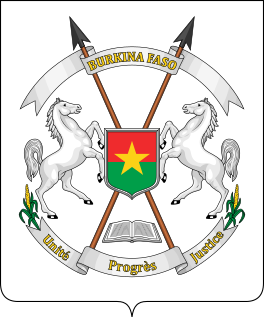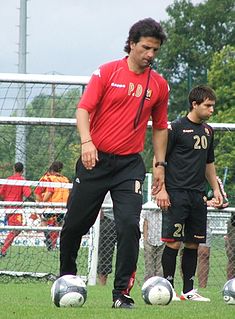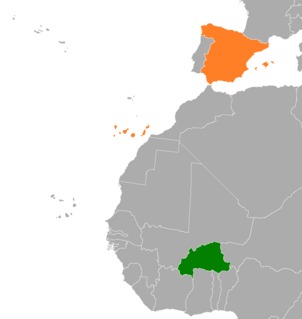| |||||
| Decades: | |||||
|---|---|---|---|---|---|
| See also: | |||||
The following lists events that happened during 2016 in Burkina Faso.
| |||||
| Decades: | |||||
|---|---|---|---|---|---|
| See also: | |||||
The following lists events that happened during 2016 in Burkina Faso.

Burkina Faso, officially the Republic of Burkina Faso, is a landlocked country in West Africa. It covers an area of around 274,200 square kilometres (105,900 sq mi) and is surrounded by six countries: Mali to the north; Niger to the east; Benin to the southeast; Togo to the southeast; Ghana to the south; and Ivory Coast to the southwest. The July 2019 population estimate by the United Nations was 20,321,378. The country's official language of government and business is French. Roughly 50% of the population speaks the Mossi language natively. Formerly called the Republic of Upper Volta (1958–1984), the country was renamed "Burkina Faso" on 4 August 1984 by erstwhile President Thomas Sankara. Its citizens are known as Burkinabé. Its capital is Ouagadougou.

The economy of Burkina Faso is based primarily on substance farming and livestock raising. Burkina Faso has an average income purchasing-power-parity per capita of $1,900 and nominal per capita of $790 in 2014. More than 80% of the population relies on subsistence agriculture, with only a small fraction directly involved in industry and services. Highly variable rainfall, poor soils, lack of adequate communications and other infrastructure, a low literacy rate, and a stagnant economy are all longstanding problems of this landlocked country. The export economy also remained subject to fluctuations in world prices.

The history of Burkina Faso includes the history of various kingdoms within the country, such as the Mossi kingdoms, as well as the later French colonisation of the territory and its independence as the Republic of Upper Volta in 1960.

The music of Burkina Faso includes the folk music of 60 different ethnic groups. The Mossi people, centrally located around the capital, Ouagadougou, account for 40% of the population while, to the south, Gurunsi, Gurma, Dagaaba and Lobi populations, speaking Gur languages closely related to the Mossi language, extend into the coastal states. In the north and east the Fulani of the Sahel preponderate, while in the south and west the Mande languages are common; Samo, Bissa, Bobo, Senufo and Marka. Burkinabé traditional music has continued to thrive and musical output remains quite diverse. Popular music is mostly in French: Burkina Faso has yet to produce a major pan-African success.

The regions of Burkina Faso are divided into 45 administrative provinces. These 45 provinces are currently sub-divided into 351 departments or communes.

Air Burkina SA is the national airline of Burkina Faso, operating scheduled services from its main base at Ouagadougou Airport. to one domestic destination, Bobo-Dioulasso, as well as regional services to Togo, Benin, Mali, Niger, Côte d'Ivoire, Senegal and Ghana. From 2001 to 2017, the airline was majority owned by an AKFED/IPS consortium, but is now back in government ownership, with reports that a new investor is being sought.

The Agacher Strip War was a war fought by Burkina Faso and Mali over a 100-mile (160 km) long strip of land located in the northern Burkina Faso province of Oudalan. The area, thought to contain considerable amounts of natural gas and mineral resources, was the center of a long-term border dispute between the two countries that erupted into an armed conflict on two occasions.

Roch Marc Christian Kaboré is a Burkinabé politician and banker and the President of Burkina Faso, in office since 2015. Previously he served as the Prime Minister of Burkina Faso between 1994 and 1996 and President of the National Assembly of Burkina Faso from 2002 to 2012. He also served as President of the Congress for Democracy and Progress (CDP). In January 2014, he left the ruling CDP and joined a new opposition party, the People's Movement for Progress.

The Unicameral National Assembly is Burkina Faso's legislative body. In 1995, it became the lower house of a bicameral Parliament, but the upper house was abolished in 2002. The upper house was to have been restored under the name "Senate" in the June 2012 constitutional amendments. This revision was never executed due to an extended and unresolved political confrontation over the Senate's establishment, which left the country effectively with a unicameral legislature as of the October 2014 constitutional crisis.

Aristide Bancé is a Burkinabé footballer, who plays as a striker for Horoya AC and the Burkina Faso national team.

Paulo Jorge Rebelo Duarte is a Portuguese retired footballer who played as a central defender, and a manager.

Christianity is a minority religion in Burkina Faso. According to The World Factbook in 2019, Christians constitutes approximately 30% of the population, with Catholics representing 23.3% and Protestants 6.5%.. According to official government estimates in 2008 the percentages are lower: 23.2% are Christians. The exact percentages might be hard to accurately predict due to a high degree of Syncretism that occurs in the country between Christians or Muslims and Traditional indigenous beliefs.

Human rights in Burkina Faso are addressed in the constitution. The 2009 Human Rights Report by the United States Department of State noted concerns regarding restrictions on the press and the operation of the judiciary system.

Burkina Faso sent a delegation to the 2012 Summer Paralympics in London, United Kingdom, from 29 August to 9 September 2012. This was the country's fifth appearance at a Summer Paralympic Games. The Burkinese delegation to London consisted of two athletes, Lassane Gasbeogo and Kadidia Nikiema, who competed in wheelchair cycling at the Brands Hatch race circuit in Kent. Neither athlete won any medals in their respective events, with the best finish of Burkina Faso at these Paralympics coming from Nikiema in the women's road trial trial H3 race with a sixth-place result.

General elections were held in Burkina Faso on 29 November 2015. The elections were the first national elections in the country since the 2014 Burkinabé uprising and the departure of President Blaise Compaoré, who had ruled Burkina Faso for 27 years. The party of former President Compaoré, the Congress for Democracy and Progress, was banned from running a presidential candidate but was still able to participate in the parliamentary election.

Yacouba Isaac Zida is a Burkinabé military officer who briefly served as Burkina Faso's acting head of state in November 2014. He took power in the aftermath of the 2014 Burkinabé uprising, sidelining a more senior officer, Honoré Nabéré Traoré. A few weeks later, a civilian, Michel Kafando, was chosen to replace Zida as transitional head of state; Kafando then appointed Zida as Prime Minister on 19 November 2014.

Burkina Faso–Sweden relations refers to the current and historical relationship between Sweden and Burkina Faso. Burkina Faso has a non resident ambassador located in Copenhagen, Denmark and an honorary consulate in Uppsala.

Terrorism in Burkina Faso refers to non-state actor violence in Burkina Faso that is carried out with the intent of causing fear and spreading extremist ideology. Terrorist activity primarily involves religious terrorism conducted by foreign-based organizations, although some activity occurs because of communal frustration over the lack of economic development. Recent attacks are concentrated in the Hauts-Bassins, Boucle du Mouhoun, Nord, Sahel, and Est regions, along the border with Mali and Niger. A series of attacks in Ouagadougou in 2016, 2017, and 2018 by Al-Qaeda in the Islamic Maghreb and its affiliates was particularly deadly, garnering international attention.

Burkina Faso–Spain relations are the bilateral and diplomatic relations between these two countries. Burkina Faso does not have an embassy in Spain, but its embassy in Paris, France, is accredited to Spain. and consulates in Almería, Barcelona, Madrid and Valencia. Spain has no embassy in Burkina Faso, but its embassy in Abidjan, Ivory Coast is accredited to Burkina Faso, and a consulate in Ouagadougou.
| This Burkina Faso-related article is a stub. You can help Wikipedia by expanding it. |
| This year in Africa article is a stub. You can help Wikipedia by expanding it. |